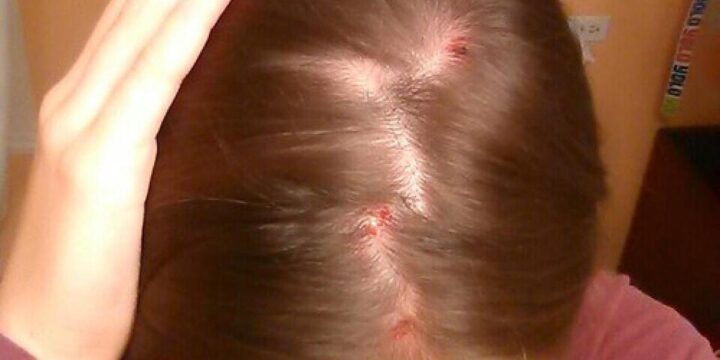Getting to the Root of the Problem: Managing Scalp Acne with Medicated Shampoos
Scalp acne is a common skin condition that leaves many people red-faced. Those persistent and painful pimples popping up on our heads can make us want to pull our hair out. But before you tear your tresses in frustration, know that “Shampoo For Acne On Scalp” provides an effective way to nip scalp acne in the bud.
Acne on the scalp forms for similar reasons as facial acne – excess oil, clogged pores, bacterial buildup, and inflammation. The scalp is prone to these issues due to the abundance of oil-producing sebaceous glands feeding the hair follicles. Hair products like gels and mousses or health conditions like hormones and stress can further exacerbate clogging and bacteria. The result is those unattractive and bothersome pimples.

Shampoo For Acne On Scalp tackles scalp acne head-on with active ingredients that clear pores, reduce inflammation, and fight bacteria. Using a targeted shampoo provides a simple, convenient treatment that tackles the problem right at the source. Read on to understand the benefits of medicated shampoos and to learn tips for effectively incorporating them into your scalp acne treatment regimen.
How Do Medicated Shampoos Work?
Shampoo For Acne On Scalp combats scalp acne using a combination of antibacterial, antimicrobial, and keratolytic ingredients. These active agents work together to unclog follicles, kill acne-causing bacteria, reduce swelling, and clear away dead skin cells. The result is a squeaky clean scalp primed to heal and prevent further breakouts.
Some of the most common anti-acne ingredients found in medicated shampoos include:
- Salicylic Acid – A beta hydroxy acid that dissolves pore-clogging oil and debris. It also reduces inflammation.
- Sulfur – Absorbs excess oil and kills p. acnes bacteria that causes acne. Its keratolytic properties help lift dead skin cells.
- Pyrithione Zinc – This antimicrobial limits the growth of fungus and bacteria like C. albicans that contribute to dandruff and acne.
- Ketoconazole – This antifungal and anti-inflammatory ingredient fights Malassezia fungus implicated in fungal acne.
- Tea Tree Oil – The powerful disinfecting properties of tea tree oil reduce acne-causing bacteria.
Finding the right Shampoo for Acne on the Scalp means looking for formulations with some combination of these scalp heroes. The shampoo aisle of your local drugstore is a good place to start. Look for well-known brands like Neutrogena T/Sal, Selsun Blue, Head & Shoulders, and Nizoral. Check that the active ingredients match scalp concerns like excess oil, itchiness, flakes, and acne.
Dermatologist-recommended options like Sebamed Anti-Dandruff Shampoo, Paul Mitchell Tea Tree Special Shampoo, and Dermasence Acne Shampoo are also worth exploring. Those with severe scalp acne may require prescription-strength formulations like clobetasol foam or ketoconazole foam. A dermatologist can prescribe these stronger treatments as needed.
Tips for Using Medicated Shampoo for Scalp Acne
To clear up scalp acne, be diligent and patient about properly using a medicated shampoo. Follow these tips to maximize results:
- Lather up 2-3 times per week. Use the shampoo in place of regular shampoo during those washes.
- Massage a quarter-sized amount into damp hair and scalp for 3-5 minutes before rinsing out. Let it sit!
- Target problem areas prone to breakouts like the hairline, behind the ears, and back of the head.
- Use cool water when rinsing, as hot water can irritate the scalp.
- Consider a shampoo brush for evenly distributing product and exfoliating buildup.
- Be patient! It can take 4-6 weeks of consistent use to see a difference. Stick with it.
- If using an anti-dandruff shampoo, consider also using a conditioner to avoid overly drying the scalp.
- Reduce use to 1-2 times a week once breakouts and oiliness subside.
- Continue occasional use even after acne clears to prevent recurrence.
Watch Out for Potential Side Effects
Medicated shampoos are safe for most people when used as directed, but be aware of potential side effects including:
– Scalp irritation, redness, dryness or peeling
– Hair drying out or becoming brittle
– Headaches
– Eye irritation if product drips into eyes
Discontinue use if irritation occurs. Using a conditioner and limiting wash frequency can help reduce irritation. See a doctor if symptoms persist or worsen.
Lifestyle Tips for Scalp Acne Prevention
While medicated shampoo tackles the root cause, lifestyle measures also play a role in managing scalp acne. Try these tips:
– Shampoo and rinse hair daily to avoid oil and product buildup.
– Limit the use of hair products like gels, mousses, and hairsprays that can clog pores.
– Reduce heat styling from blow dryers, straighteners, and curling irons.
– Keep hair off the forehead and neck to prevent excess oil transfer. Try a headband.
– Don’t pick or overscrub pimples as this can worsen irritation and infection.
– Manage stress levels and get enough sleep, as stress can exacerbate scalp acne.
– Avoid greasy caps and helmets that rub on the forehead and can irritate acne.
– Stick to gentle, fragrance-free hair products if prone to scalp acne.
When to See a Dermatologist
Consult a dermatologist if over-the-counter shampoos fail to clear up stubborn scalp acne. A dermatologist can assess the severity of acne and rule out other scalp conditions like fungal infections. Prescription topical or oral medications may be warranted for more significant cases of scalp acne.
Dermatologists may also recommend specialized treatment options like light therapy or cortisone injections for very inflamed, cystic acne on the scalp. The earlier you seek professional guidance, the sooner you can unravel yourself from frustrating scalp acne woes.
Dandruff vs Scalp Acne – Which Do You Have?
Both dandruff and scalp acne cause annoying flaking, itching, and redness. However, they stem from different causes and require targeted treatment. Is it dandruff or scalp acne? Consider these differences:
- Dandruff: Caused by a yeast-like fungus that leads to flaking and itching. Greasy yellow flakes with no redness or pimples. Anti-dandruff shampoos contain anti-fungal ingredients like ketoconazole or pyrithione zinc to treat the underlying cause.
- Scalp Acne: Caused by clogged pores and bacterial buildup leading to red, irritated pimples. Greasy skin or whiteheads may be present. Dandruff shampoos are too mild. Use medicated shampoos with antibacterial agents like benzoyl peroxide or salicylic acid.
If unsure, get a dermatologist to diagnose the condition through a physical exam and possible scalp scraping. Using the right treatment for the type of scalp issue is key for relief.
The Takeaway on Medicated Shampoos for Scalp Acne
Don’t let scalp acne detract from healthy, beautiful hair. Using the right medicated shampoo clears the bumps at the root of the problem for a pimple-free scalp. Look for formulas with acne-fighting ingredients like salicylic acid, pyrithione zinc, sulfur, and ketoconazole. Consistent use along with lifestyle measures provides a one-two punch against stubborn scalp acne.
With a targeted shampoo treatment regimen, you can kiss those pesky, painful scalp pimples goodbye and get back to simply enjoying washing and styling your locks. No more red bumps marring your mane! By getting to the bottom of what causes scalp acne and taking action, you can have a pep in your step with a refreshed, rejuvenated scalp.


